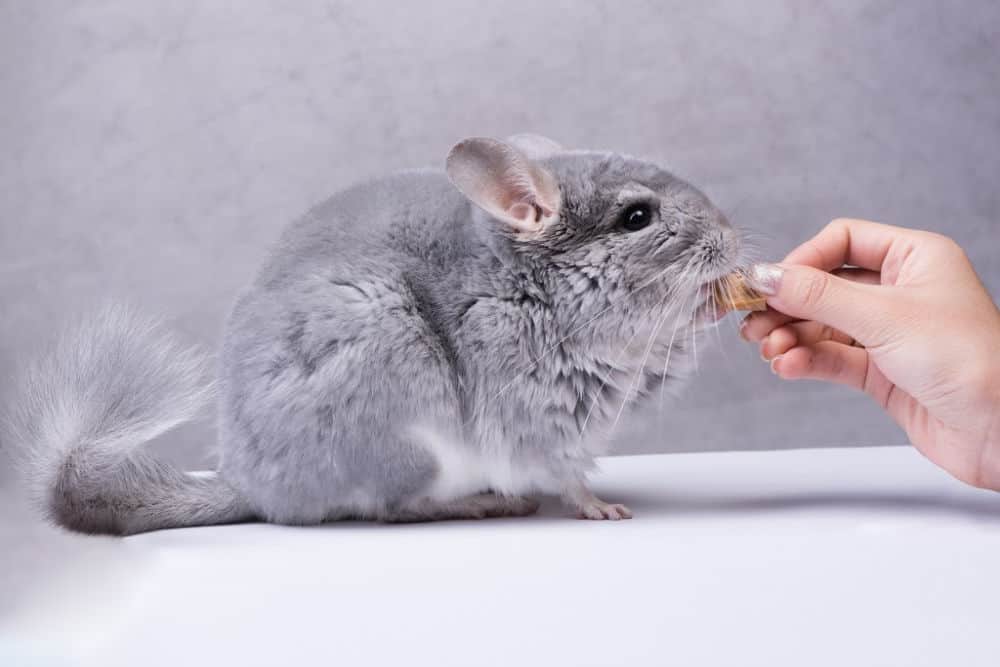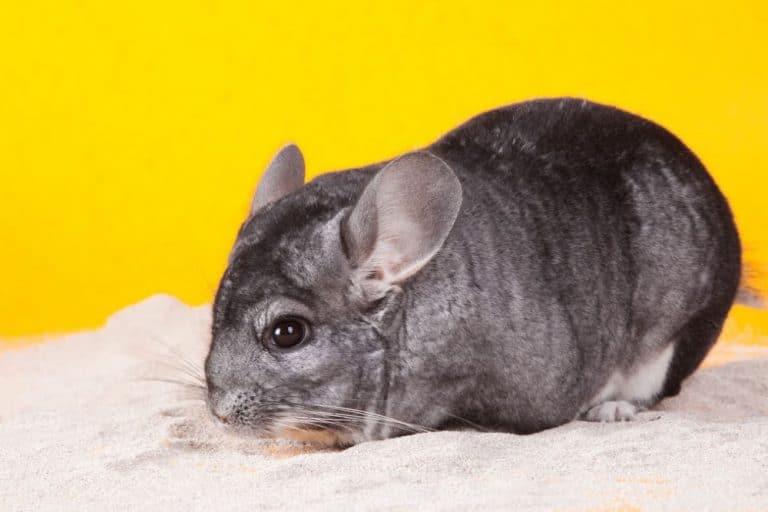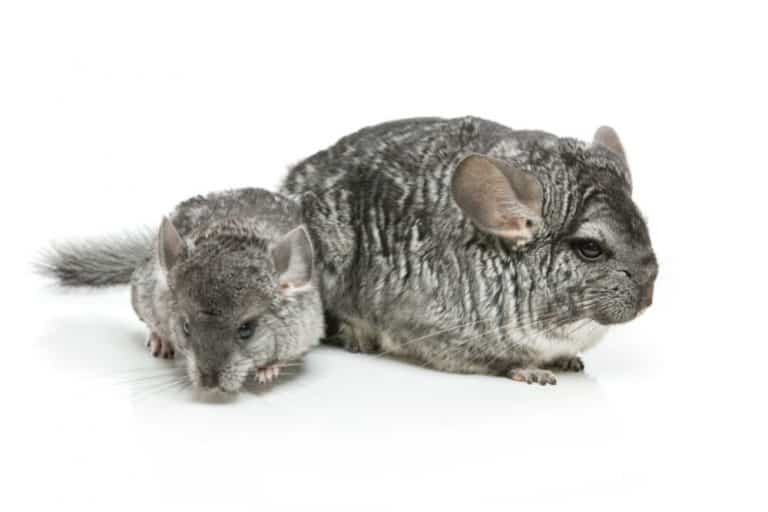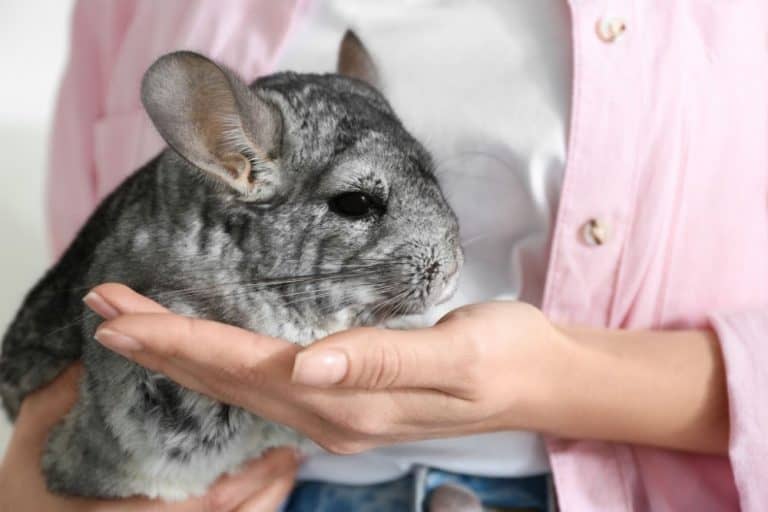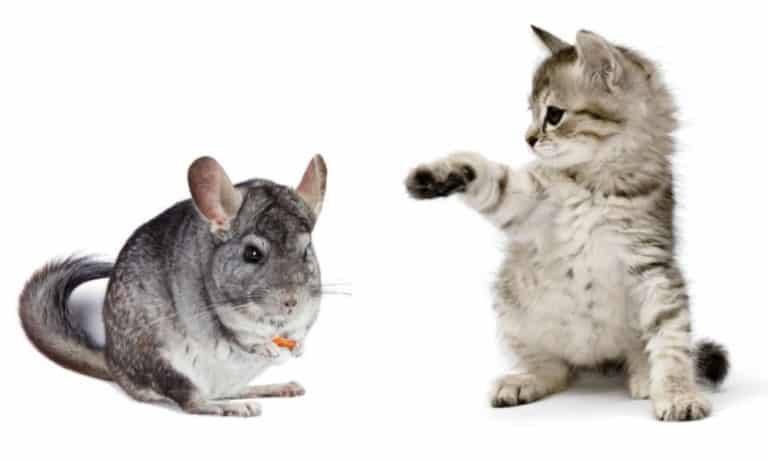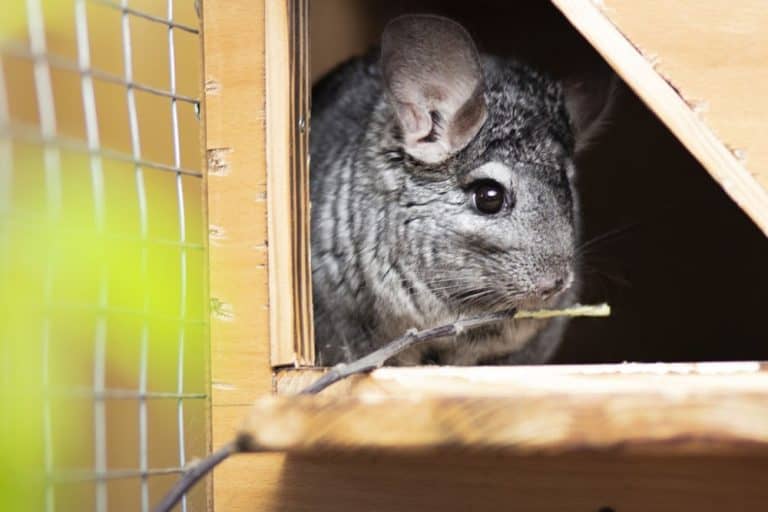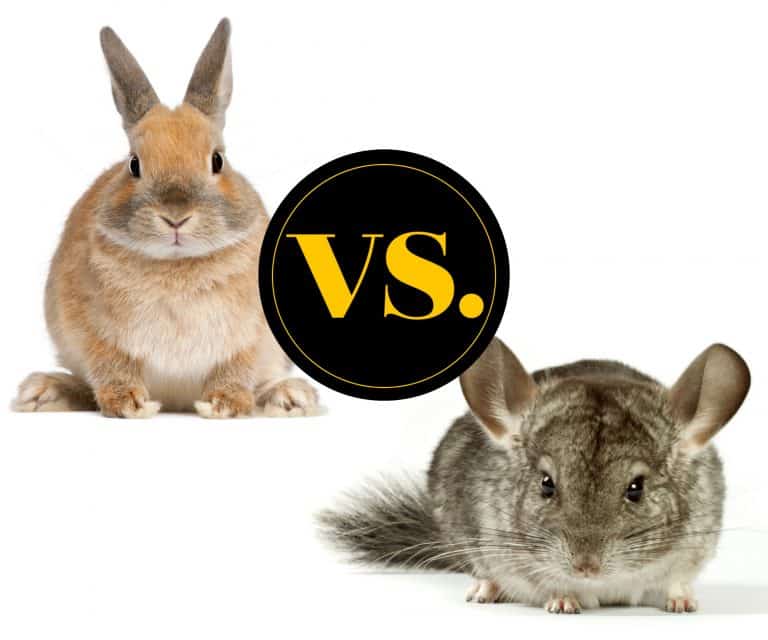Can a Chinchilla Eat Hamster or Rabbit Food?
We’ve all been there. You do your routine of spot cleaning your chin’s cage and feeding. Only to find that you forgot to pick up some chinchilla food at the store. There are only a few pellets left, so you dash to the store. But your local pet shop is out. You start looking at all the different foods and start weighing your options. Can a chinchilla eat hamster or rabbit food? Let’s consider this question together.
Can A Chinchilla Eat Hamster Or Rabbit Food?
In short, no. A chinchilla can not sustain itself on hamster or rabbit food. Our animals all have different foods that are scientifically specialized for them. Research has gone into these foods to see what nutritional requirements give your pets a long and healthy life. Feeding a chinchilla food meant for another animal could be detrimental.
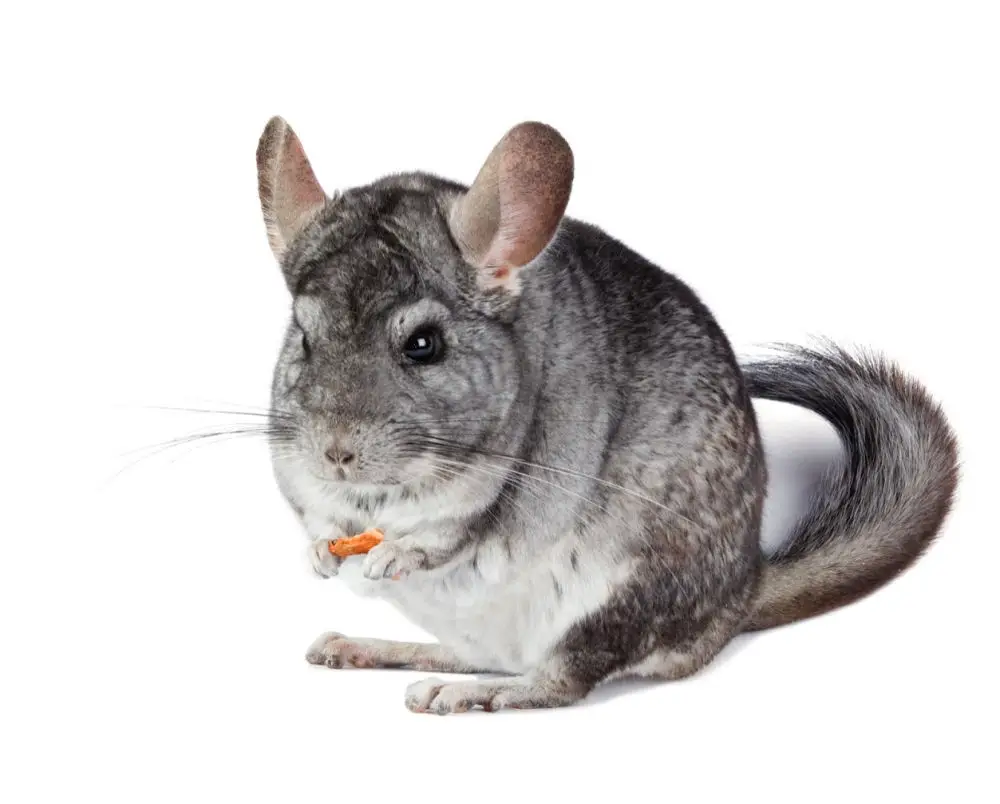
Hamster food is filled with nuts, seeds, corn, and peas. Hamster food is the worst diet that you could give your chinchilla, even if for short-term. Chinchillas have a sensitive digestive tract, and hamster food is sure to cause significant issues. Not only is it super high in fats, but it comes with everything that is deemed unsafe and toxic.
Rabbits might have a similar diet to chinchillas, but since they are not rodents, they have different nutritional needs. Feeding a high-quality rabbit food might not hurt your chinchilla for a brief period, but it is still not recommended. And making a sudden switch to a rabbit feed could upset their stomachs and cause diarrhea.
Nutritional Needs Of Each Animal
To better compare your chinchilla diet to hamster or rabbit food, it is best to look at the nutritional label. The first and foremost thing to remember is that 80-90% of your chinchilla’s diet is timothy hay. Hay should be offered to them in large quantities daily. As for pellets, your chinchilla will only eat 1-2 tablespoons of it daily.
Chinchilla Nutrition
Most pellets have a crude analysis of:
- 30% fiber
- 4-16% protein
- 35% healthy carbohydrates
- 3.5% fat
- 4% sugar
- 6% of minerals
A high-quality chinchilla food will have alfalfa as the main ingredient and will also be high in calcium. These nutritional needs are hard to find in a hamster or rabbit diet.
Hamster Nutrition
By comparison, hamsters need:
- 6-15% fiber
- 17-19% protein
- 64% carbohydrates
- 4-7% fat
As you can see, hamsters need less fiber, more protein, and more carbohydrates. Feeding a hamster food to your chinchilla could cause serious harm.
Rabbit Nutrition
And rabbits have an even varied diet that consists of timothy hay and a low calcium pellet.
- 13-20% fiber
- 12-15% protein
- 45-50% carbohydrates
- 2-4% fat
These numbers are fastly different from a chinchilla’s needs. Feeding this to your chinchilla could stunt growth and could cause diabetes.
What Are The Risks Of Feeding Improper Diets?
For a chinchilla, their diet can affect every inch of their bodies inside and out. The hamster and rabbit diet does not have the same amount of protein that a chinchilla needs. If you give your chinchilla food with too little protein, like the rabbit diet, then their hair will become dull and dry. If you give them too much protein, like hamster food, it could cause kidney and liver damage.
Both of these diets also contain too little fiber as well. Fiber is vital for the digestive health of your chinchilla. It is also crucial for teeth health. A diet without enough fiber will lead to overgrown teeth, and chewing of the fur. A hamster and rabbit diet is also extremely high in carbohydrates. These added carbs can lead to obesity and diabetes in chinchillas. And finally too much fat in a chinchilla diet could cause liver disease.
Feeding food designed for another animal could be detrimental to your chinchilla, and we never recommend it.
Why Do Some Owners Feed Rabbit Food?
Feeding chinchillas rabbit food started when chinchillas became popular to have. It was hard for some people to find high-quality chinchilla food in rural areas, but rabbit food is in their local feed stores. People started comparing different brands to popular chinchilla feed to see which was the closest. And while some rabbit foods are close, none are exactly the same.
With Amazon and Chewy delivering all over the US, there is no reason not to have access to high-quality chinchilla food anymore. And yet, owners still feed their chinchillas rabbit food because it is cheaper or because they already have rabbits. But they do this with extreme caution. There are only a few rabbit foods that they approve of since not all pellets are the same. These high-quality rabbit foods are not found at your local pet store, though. Some of them are specially ordered or bought through feed stores in bulk. These foods are the closest to chinchilla food as possible, but still not the same.
So if you needed food in an emergency, these rabbit foods are not as easily accessible.
What To Do If You Run Out Of Food
Instead of turning to a rabbit or hamster food when you run out, there are a few things you can do.
- If the store is out of the chinchilla food, you usually get, grab another brand. Chances are the pet store that has another brand of chinchilla food you can use. This brand might be cheaper and filled with treats. So you will have to take care to remove all seeds and dried fruits and vegetables. All that should be left now are pellets that can last until you can find your brand again. You will need to mix small amounts of this food into what you have left to prevent an upset stomach.
- You can also choose not to get your chinchilla a substitute food and give your chinchilla larger amounts of timothy hay instead. This might be a safer option in the long run to prevent an upset stomach. Chinchillas can go up to three days on hay alone without having to be supplemented with other vitamins.
What You SHOULDN’T Do
If you ever run out of chinchilla food, there are a few things that might be tempting, but wouldn’t have a great outcome.
- Never feed a food formulated for another animal. This can give your chinchilla an upset stomach and could result in a trip to the vet.
- Never supplement with fresh fruits and veggies. Chinchillas have a diet that consists of dry grasses and hay. If you were to give them too many fresh fruits and vegetables, it could spike their blood sugar and cause seizures. Fresh produce is never ok to give to a chinchilla.
Preventing The Situation
The best thing you can do to prevent running out of food is to have it auto-shipped to you. Chewy.com and Amazon.com have the option to auto-ship the food to you at your determined frequency. Having food auto-shipped is easy, and you will never have to worry about it again. Auto-shipping usually comes with a discount too, so it is a win-win.
What Chinchilla Foods Are The Best?
If you are interested in buying your chinchilla foods online, there are plenty of brands out there that are great! Here are a few brands that we put at the top of our lists.
Mazuri Chinchilla Food
Mazuri is a favorite among chinchilla owners and breeders alike. Mazuri is a high-quality brand that has the best crude analysis for all of your chinchilla’s needs. It’s not filled with junk or treats that will make your chinchilla a picky eater. This 2.5 lb bag saves you 5% when you sign up for auto-ship. 2.5 pounds is enough to last a single chinchilla one and a half months if they don’t overeat. Have more than one chinchilla? No problems! Just choose the 25-pound bag at check out. But never order more than your chinchillas can eat within three months.
Oxbow Essentials Chinchilla Food
Oxbow is another high-quality food that many pet owners turn to. It is packed with all the things proven to keep your chinchilla healthy and strong. Most chinchillas love the flavor and have no problems adjusting to it. Again, you can save 5% at checkout when you enroll in auto-ship. And the beauty of ordering this brand on Chewy is that it comes in a 3,10, and 25-pound bag to meet everyone’s needs.
Science Selective Chinchilla Food
Another great chinchilla food is Science Selective. This food is good quality food that a lot of owners love. The only downside is that you can’t order it in larger bags if you own several chinchillas. But with that 5% savings, you can get it delivered as often as you need.
Conclusion
Can a chinchilla eat hamster or rabbit food? No. Feeding another species of food is never a good idea. And for the health of your chinchilla, we recommend that you always use food made for chinchillas. There are lots of great brands available in feed stores and by mail. We have come a long way from when chinchillas were first introduced to the pet trade. Now we can give them the best life possible.
Related Questions
What is poisonous to chinchillas?
There are a number of foods that are poisonous to chinchillas, so always double-check before you feed them. DO NOT FEED your chinchilla with the following: asparagus, avocado, peas, cabbage, corn, lettuce, broccoli, spinach, rhubarb, and rhubarb leaves. Other dangerous foods are sunflower seeds and peanuts. This is not an exhaustive list, so unless there is no doubt about whether something is safe to feed, it is best to avoid it.
What foods can chinchillas eat?
In moderation, fresh fruits and vegetables can be offered as a healthy and occasional treat for your chinchilla– though should not make up more than 10 percent of his diet. Some suitable veggie options for chinchillas are carrots, kale, parsley, dandelion greens, sweet potato, squash, collard greens, and turnip greens. Fruit choices include strawberries, pears, bananas, and apples.

